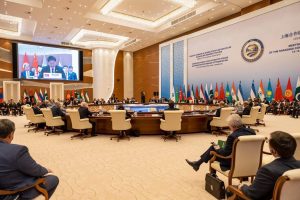Samarkand, Uzbekistan, became the center of world attention in mid-September as leaders of the Shanghai Cooperation Organizations (SCO) states gathered to discuss the organization’s goals, challenges, and how to tackle pressing global issues. During the 22nd Meeting of the Council of Heads of State of the SCO, Mongolia reiterated Ulaanbaatar’s position to maintain its observer status; however, Mongolia will still be active in regional trade and economic activities.
In 2004, Mongolia became the first observer state in the SCO during the Tashkent Summit, followed by India, Pakistan, and Iran in 2005. All three of the latter states have chosen to accede to full membership. Although relations between the SCO and Mongolia have developed in the past decade, Ulaanbaatar has been hesitant to become a full member. Mongolia’s concerns stem not only from Ulaanbaatar’s foreign policy outlook but trends in regional international relations.
When the SCO first began in 2001, member states focused on keeping the security status quo and counterterrorism. The SCO has the scope and potential to be a crucial contributor to global peace and security as two of its member countries (China and Russia) are also part of the U.N. Security Council, and four are nuclear weapons states.
However, fulfilling this potential heavily depends on the leadership of each member state, financial contributions, and, most importantly, whether the strategic interests of each member state are aligned. By the same token, however, its member states’ potential and capabilities are causing competition for resources and partnerships.
Since Mongolia joined the SCO as an observer state in 2004, geopolitical dynamics and the general outlook of international relations have changed. Bilateral ties between SCO member states have changed dramatically – in some cases for the worse. Since India joined the SCO in 2017, the China-India border issue has escalated, and India and Pakistan’s historical conflicts continue.
Moreover, the world is watching Russia’s annexation of Ukrainian territories, which is causing serious concerns among its fellow SCO member states. Meanwhile, Kyrgyzstan and Tajikistan – two original SCO members – were engaged in active conflict along their disputed border at the time of the Samarkand summit.
And the SCO could become even more complicated in the future, with Iran set to officially gain membership status in 2023, while its rivals in the Middle East – Turkey, Saudi Arabia, Bahrain, Egypt, and the UAE – are either currently or in the process of becoming SCO dialogue partners, and possible future members.
These internal geopolitical conflicts surely do not bestow confidence in the future activities of the organization.
The discussion on whether Mongolia should accede to SCO membership has been primarily dominated by analysts positioning Ulaanbaatar in the periphery of the Moscow-Beijing orbit. However, these views diminish and undermine Mongolia’s independent foreign policy.
Mongolia’s multi-pillared foreign policy and non-nuclear weapons states status (NNWS) are significant reasons for Ulaanbaatar to abstain from joining certain organizations and security alliances. Based on the combination of these two foreign policy mechanisms, Ulaanbaatar consciously chooses diplomacy and strong bilateral relations versus depending on regional security groupings – whether the U.S. alliance network or the SCO.
Moreover, it is not in Ulaanbaatar’s interest to willfully bar itself from the freedom to pursue a multi-pillared foreign policy as a democratic nation. This allows Ulaanbaatar to freely establish and strengthen bilateral relations with all parties. For example, Mongolia has strategic partnerships (some comprehensive strategic partnerships) with Russia, China, Japan, India, and the United States.
In the eyes of Mongolian policymakers, diplomacy and bilateral relations must prevail over regional security alliances, which carry more risk due to the many political, economic, and security factors that have the potential to create a rift if and when there is a clash of strategic interests.
In 2021, during Foreign Minister of Mongolia Battsetseg Batmunkh’s official visit to Moscow, she gave an interview with Strana Industriya. Battsetseg stated Mongolia’s position to remain as an observer state in the SCO.
On the sideline of the Samarkand summit, Mongolian President Khurelsukh Ukhnaa met with the secretary general of the SCO, Zhang Ming. During their conversation, Khurelsukh reiterated Ulaanbaatar’s position to maintain its observer status, while noting that Mongolia will cooperate with trade and economic activities.
Indeed, for Mongolia, the sideline meetings are arguably more important than the SCO summit itself. During the Samarkand summit, one of many important meetings for Mongolia was the Russia-Mongolia-China heads of state trilateral summit. This year’s meeting was headed by Russian President Vladimir Putin. The Mongolian president will lead the trilateral meeting in 2024.
During the Russia-Mongolia-China trilateral meeting, the head of states discussed the economic corridor and a gas pipeline project currently under development. In his remark, Khurelsukh stated, “Russia and Mongolia have been cooperating in the feasibility study of the gas pipeline project that would go through Mongolia. If implemented, this project would be the second major infrastructure that connects our three nations since 1955. And Mongolia is wholeheartedly hopeful to continue the trilateral dialogue and make progress on this major development.”
Mongolia’s observer status in the SCO remains a hot topic in the policymaking arena. However, given the current geopolitical environment, the Mongolian government has decided to pursue its own course of foreign policy and strengthen bilateral relations – an example of far-sighted policymaking.

































